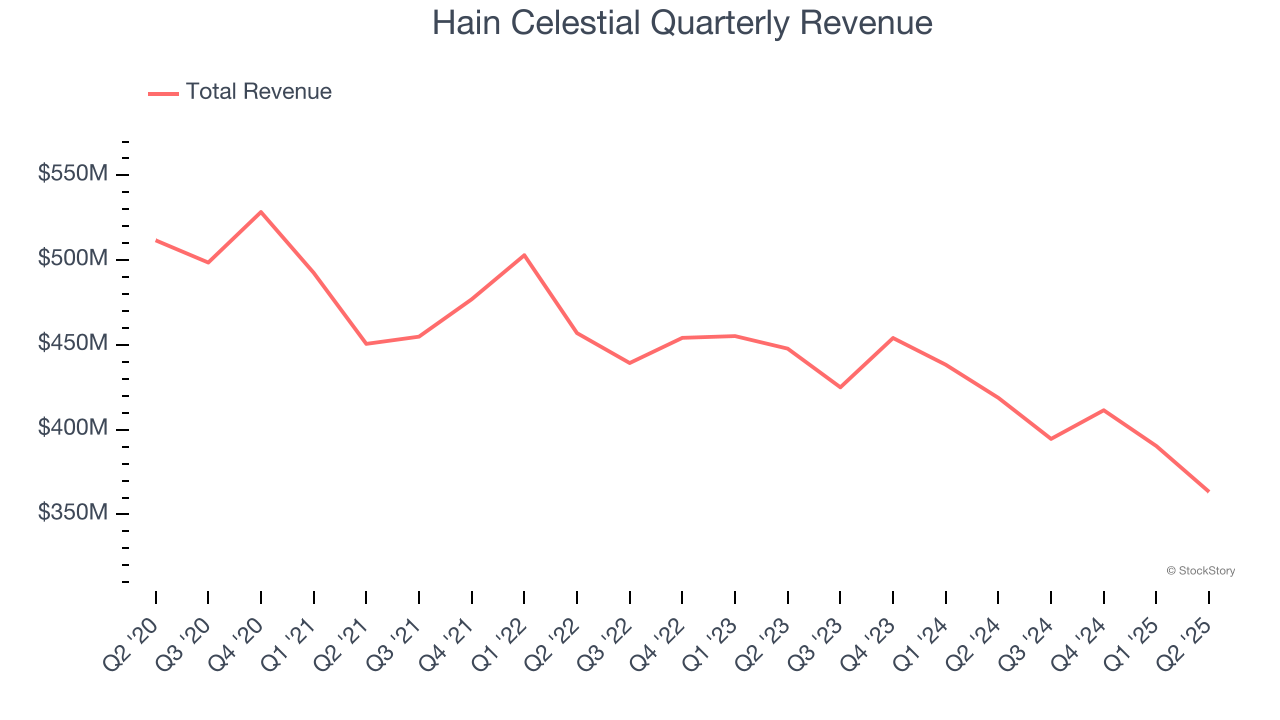
Natural food company Hain Celestial (NASDAQ:HAIN) missed Wall Street’s revenue expectations in Q2 CY2025, with sales falling 13.2% year on year to $363.3 million. Its non-GAAP loss of $0.02 per share was significantly below analysts’ consensus estimates.
Is now the time to buy Hain Celestial? Find out by accessing our full research report, it’s free.
Hain Celestial (HAIN) Q2 CY2025 Highlights:
- Revenue: $363.3 million vs analyst estimates of $371.9 million (13.2% year-on-year decline, 2.3% miss)
- Adjusted EPS: -$0.02 vs analyst estimates of $0.03 (significant miss)
- Adjusted EBITDA: $19.91 million vs analyst estimates of $27.72 million (5.5% margin, 28.2% miss)
- Operating Margin: -69.3%, down from 5.5% in the same quarter last year (due to pre-tax non-cash impairment charges of $252 million related to goodwill and certain intangible assets)
- Free Cash Flow was -$8.87 million, down from $30.7 million in the same quarter last year
- Organic Revenue fell 11% year on year vs analyst estimates of 7.3% declines (365.7 basis point miss)
- Market Capitalization: $194 million
Company Overview
Sold in over 75 countries around the world, Hain Celestial (NASDAQ:HAIN) is a natural and organic food company whose products range from snacks to teas to baby food.
Revenue Growth
Reviewing a company’s long-term sales performance reveals insights into its quality. Any business can put up a good quarter or two, but the best consistently grow over the long haul.
With $1.56 billion in revenue over the past 12 months, Hain Celestial is a small consumer staples company, which sometimes brings disadvantages compared to larger competitors benefiting from economies of scale and negotiating leverage with retailers.
As you can see below, Hain Celestial struggled to generate demand over the last three years. Its sales dropped by 6.2% annually, a poor baseline for our analysis.

This quarter, Hain Celestial missed Wall Street’s estimates and reported a rather uninspiring 13.2% year-on-year revenue decline, generating $363.3 million of revenue.
Looking ahead, sell-side analysts expect revenue to decline by 2.1% over the next 12 months. it’s hard to get excited about a company that is struggling with demand.
Software is eating the world and there is virtually no industry left that has been untouched by it. That drives increasing demand for tools helping software developers do their jobs, whether it be monitoring critical cloud infrastructure, integrating audio and video functionality, or ensuring smooth content streaming. Click here to access a free report on our 3 favorite stocks to play this generational megatrend.
Organic Revenue Growth
When analyzing revenue growth, we care most about organic revenue growth. This metric captures a business’s performance excluding one-time events such as mergers, acquisitions, and divestitures as well as foreign currency fluctuations.
Hain Celestial’s demand has been falling over the last eight quarters, and on average, its organic sales have declined by 4.8% year on year. 
In the latest quarter, Hain Celestial’s organic sales fell by 11% year on year. This decrease represents a further deceleration from its historical levels. We hope the business can get back on track.
Key Takeaways from Hain Celestial’s Q2 Results
We struggled to find many positives in these results. Its organic revenue missed and its EBITDA fell short of Wall Street’s estimates. Overall, this was a weaker quarter. The stock traded down 22.2% to $1.68 immediately following the results.
The latest quarter from Hain Celestial’s wasn’t that good. One earnings report doesn’t define a company’s quality, though, so let’s explore whether the stock is a buy at the current price. The latest quarter does matter, but not nearly as much as longer-term fundamentals and valuation, when deciding if the stock is a buy. We cover that in our actionable full research report which you can read here, it’s free.
